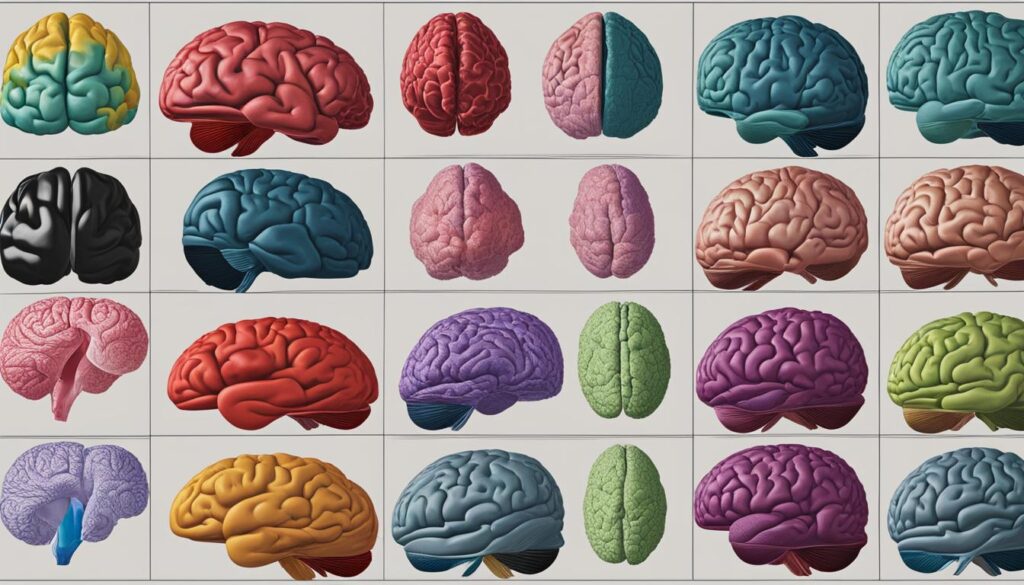Leonard Mlodinow’s “The Drunkard’s Walk” is a thought-provoking audiobook that explores the role of randomness in shaping our lives. Comprehensive and engaging, the audiobook offers valuable insights into the unpredictable nature of chance events and how they impact different aspects of our lives, from success and decision-making to relationships and financial outcomes. Through expert analysis, real-life examples, and practical applications, Mlodinow provides a compelling case for understanding randomness as an essential factor in our daily lives.
Key Takeaways:
- The Drunkard’s Walk emphasizes the impact of randomness in various aspects of our lives.
- The audiobook explores the unpredictable nature of chance events and their extensive influence.
- Cognitive biases play a vital role in how we perceive and comprehend randomness.
- Understanding randomness can improve decision-making processes and provide practical applications in different fields.
- Statistics is a valuable tool for analyzing and interpreting random events and extracting patterns and trends
Understanding Randomness
Randomness is the inherent unpredictability of events that occur independently of each other, making it difficult to discern why or how things happen. While our brains tend to find patterns in everything, randomness cannot be categorized as a pattern. The concept plays a significant role in the natural world, from the movement of atoms to the behavior of crowds.
Understanding randomness is crucial because it affects various aspects of our lives, including the choices we make and the outcomes we experience. For example, random events can significantly impact the financial markets, job opportunities, and relationships. As such, comprehending the nature of randomness is essential for decision-making and overall life management.
Leonard Mlodinow’s “The Drunkard’s Walk” delves into the intricacies of randomness and its impact on our lives, providing invaluable insights and perspectives. In the upcoming sections, we will explore the author’s insights, delve into probability, examine the link between chance events and success, discuss cognitive biases, and present real-life examples that illustrate the impact of randomness on our lives.
The distinction between randomness and chaos
It’s essential to draw a distinction between randomness and chaos. While chaos might appear random due to its complexity, it adheres to particular underlying rules. Randomness, in contrast, is inherently unpredictable and cannot be reduced to laws or theories. Although random events might occasionally seem ordered, they lack patterns and cannot be predicted.
Author’s Insights
Leonard Mlodinow, in “The Drunkard’s Walk,” shares unique insights into the role of randomness in our lives. His expertise and in-depth research provide readers with a deeper understanding of how unpredictability influences various aspects of our lives, from relationships to career trajectories.
Mlodinow also explores how our perceptions of randomness can impact our decision-making skills, showcasing how cognitive biases can cloud our judgment and lead us to believe that we have more control over our lives than we actually do. His thought-provoking perspectives challenge readers to consider the role of luck and chance in their own lives, encouraging more nuanced and insightful reflections.
Mlodinow masterfully weaves together real-world examples and scientific research to present a compelling case for the importance of understanding randomness. His explanations are clear and concise, making complex topics accessible to readers of various backgrounds and knowledge levels.
Overall, “The Drunkard’s Walk” stands out for its fresh, informative analysis of a topic that often goes overlooked. Through Mlodinow’s insights, readers are left with a greater appreciation for the unpredictable nature of the world and a newfound understanding of how randomness shapes our lives.
Exploring Probability
Probability plays a significant role in our lives, yet it can often be challenging to understand and calculate. “The Drunkard’s Walk” audiobook delves into this fascinating world, providing listeners with a comprehensive introduction to probability theory and its practical implications.
The audiobook explains how probability influences events and decision-making processes by determining the likelihood of different outcomes. Listeners will learn how to calculate and interpret probabilities, enabling them to make more informed choices and predictions in various fields.
Applications of Probability
Probability has numerous practical applications, from predicting weather patterns to analyzing stock market trends. In finance, probability helps investors determine their risk tolerance and create well-diversified portfolios that maximize returns. In healthcare, probability is used to evaluate the efficacy of medical treatments and predict the likelihood of disease outbreaks.
The table below demonstrates some everyday scenarios where probability comes into play:
| Scenario | Probability |
|---|---|
| Flipping a coin and getting heads | 50% |
| Rolling a six-sided die and getting a three | 16.67% |
| Winning the lottery jackpot | 0.0000072% |
By understanding probability and its applications, listeners of “The Drunkard’s Walk” can develop a more nuanced understanding of the world around them and make more informed decisions in their personal and professional lives.
Chance and Success
Many of us tend to attribute success solely to individual talent and hard work, but chance occurrences play a significant role in determining personal and professional achievements. Leonard Mlodinow’s “The Drunkard’s Walk” explores the role of luck in various areas of life, including careers, relationships, and financial outcomes.
Examining the correlation between chance and success, the audiobook provides valuable insights into unpredictable situations that can arise at any moment. It prompts listeners to reflect on past experiences, recognizing times when a seemingly insignificant event, such as a chance meeting or phone call, led to a life-changing opportunity or successful outcome.
Chance as a Factor in Career Success
A growing body of research has shown that luck plays a crucial role in career success. A study conducted by sociologist Lauren A. Rivera revealed that personal connections, often established through chance meetings and social networks, significantly influenced hiring practices in elite professional firms.
This finding highlights how chance can create opportunities for success that would otherwise be unattainable, challenging the notion of merit-based advancement as the sole determinant of success.
Chance in Personal Relationships and Financial Outcomes
Personal relationships and financial outcomes are also subject to the influence of chance. Meeting the right person at the right time can be a significant factor in relationship success, while financial outcomes can be impacted by unexpected events such as market fluctuations or unforeseen expenses.
Mlodinow’s examination of chance and success offers a thought-provoking analysis of how these seemingly random occurrences can shape our lives in profound ways. By acknowledging these factors, listeners can learn to embrace unpredictability and cultivate a greater appreciation for the role of chance in personal growth and achievement.
Cognitive Biases
One of the main challenges in understanding randomness is the presence of cognitive biases. Our minds often rely on heuristics and shortcuts to make sense of the world around us, and as a result, we tend to perceive patterns where there are none. This can lead to overestimating the impact of chance events or underestimating their significance, ultimately distorting our perception of reality.
For example, the confirmation bias can cause us to interpret information in a way that confirms our existing beliefs, rather than objectively evaluating the evidence. Similarly, the representativeness bias can lead us to make assumptions based on stereotypes or incomplete information, overlooking the role of chance in shaping outcomes.

By exploring cognitive biases and their impact on our understanding of randomness, “The Drunkard’s Walk” helps readers develop a more nuanced and accurate perspective on the role of chance in their lives. By recognizing the influence of cognitive biases, individuals can make more informed decisions and avoid falling prey to flawed thinking patterns.
Real-Life Examples
The concepts of randomness and probability are often hard to grasp, but The Drunkard’s Walk audiobook provides real-life examples that make them more tangible. One such instance is the story of how a coin toss determined the fate of two well-known American cities. In 1848, San Francisco and Sacramento were both vying to become California’s capital, and a coin toss was held to decide the winner. San Francisco won the toss, giving rise to its status as a thriving metropolis, while Sacramento became a bustling hub of commerce and transportation.
Another example that showcases the role of chance in our lives is the story of how a typo in a newspaper advertisement led to the formation of one of the biggest rock bands in history. In 1962, John Lennon and Paul McCartney saw an advertisement that read “Drummer Wanted” with a phone number that had an extra digit. They called the number, and the person who answered had no interest in drumming but connected them with George Harrison. This chance encounter led to the formation of the Beatles and changed the music industry forever.
These examples illustrate how seemingly small and random events can have significant consequences on our lives and shape the world we live in.
Implications for Decision Making
The audiobook “The Drunkard’s Walk” sheds light on the role of randomness in our lives and how understanding it can inform better decision-making processes. By recognizing the potential influence of chance occurrences, individuals can navigate uncertainty and make more informed choices, both in personal and professional settings. By taking into account the implications of randomness, individuals can better forecast, assess risks, and approach problem-solving with a more comprehensive perspective.
The Role of Statistics
In understanding the impact of randomness, statistics plays a vital role in analyzing and interpreting random events. Statistical analysis helps identify patterns and trends in seemingly chaotic situations, revealing insights that would otherwise be missed. By applying statistical models and methods, researchers can make sense of vast amounts of data to derive meaningful conclusions and make informed decisions. For example, in finance, statistical analysis of market trends and risk assessment can identify potential opportunities and mitigate potential losses. Understanding and utilizing statistics is essential in navigating uncertainty and making sound decisions based on data-driven insights.
Examples of Statistics in Action
| Industry | Application of Statistics |
|---|---|
| Medicine | Statistical models are used to analyze clinical trials and determine the effectiveness of new treatments. |
| Manufacturing | Statistical quality control is utilized to measure and monitor production processes, ensuring product consistency and reducing defects. |
| Marketing | Statistical analysis of consumer behavior can inform targeted advertising campaigns and predict market trends. |
These examples demonstrate the wide-ranging applications of statistics in various fields. By understanding statistical models and methods, individuals can make more informed decisions and uncover valuable insights that would otherwise remain hidden.
Practical Applications
Understanding randomness has practical applications across various fields. One such application is in forecasting, where probability theories and models based on randomness can be used to predict future trends, outcomes and events. This can be beneficial in fields such as finance, healthcare, and weather forecasting, where accurate predictions can improve decision making and help mitigate risks.
Another area where understanding randomness is crucial is in risk assessment. By identifying factors that contribute to risk and incorporating probability calculations, businesses can better evaluate potential risks and develop risk management strategies to minimize losses.
Randomness also plays a key role in problem-solving techniques, such as using simulations to model complex systems and predict behavior. This approach has been used in areas as diverse as engineering, environmental science, and economics, among others. By incorporating randomness into problem-solving methodologies, more robust and effective solutions can be developed.
The Drunkard’s Walk audiobook showcases the significance of randomness in our everyday lives. By understanding its impact and applications, individuals can make more informed decisions and navigate uncertainty more effectively.
Conclusion
Overall, “The Drunkard’s Walk” audiobook by Leonard Mlodinow offers a thought-provoking exploration of how randomness shapes our lives. Mlodinow’s unique insights and perspectives on the subject make for an engaging and informative listen for anyone interested in understanding the role of chance in various aspects of life. From the concept of randomness and exploring probability to the correlation between chance occurrences and achieving success, the audiobook covers a wide range of topics that are both relatable and relevant.
Mlodinow’s discussion of cognitive biases and the impact they have on our perception of randomness is particularly insightful, highlighting the importance of understanding how our minds tend to struggle with comprehending the influence of chance.
Moreover, the real-life examples and anecdotes presented in the audiobook make the concepts discussed more tangible and relatable, offering a glimpse into how randomness can shape our lives in unexpected ways.
Overall, “The Drunkard’s Walk” offers invaluable insights into the role of randomness in our lives and its implications for decision making. This audiobook is highly recommended for anyone seeking to broaden their understanding of this fascinating subject.
So, if you are looking for an engaging and informative audiobook that explores the fascinating world of randomness, “The Drunkard’s Walk” by Leonard Mlodinow is definitely worth checking out. This audiobook review concludes with a strong recommendation for this thought-provoking listen.
FAQ
What is "The Drunkard’s Walk: How Randomness Rules Our Lives" about?
“The Drunkard’s Walk” is an audiobook by Leonard Mlodinow that explores how randomness plays a significant role in shaping our lives. It delves into various aspects of randomness and its impact on decision-making, success, and everyday life.
What is randomness and why is it important to understand?
Randomness refers to the unpredictable nature of events. Understanding randomness is crucial because it helps us recognize that some outcomes are beyond our control and influenced by chance. By acknowledging randomness, we can make better decisions and navigate uncertainty more effectively.
What insights does Leonard Mlodinow share in "The Drunkard’s Walk"?
Leonard Mlodinow offers unique perspectives and insights on randomness and its implications. He draws from various disciplines, including mathematics, psychology, and economics, to provide readers with a comprehensive understanding of how randomness shapes our lives.
How does the audiobook explore probability?
“The Drunkard’s Walk” delves into the fascinating world of probability, explaining its concepts and demonstrating how it affects events and decision-making. It offers practical examples and explanations that make probability more accessible and relatable.
What does the audiobook say about the correlation between chance and success?
The audiobook explores the relationship between chance occurrences and achieving success. It highlights how luck plays a significant role in various aspects of life, such as careers, relationships, and financial outcomes, challenging the conventional notion of individual merit and hard work as the sole determinants of success.
How does "The Drunkard’s Walk" address cognitive biases?
“The Drunkard’s Walk” discusses cognitive biases and their impact on our understanding of randomness. It reveals how our minds often struggle to comprehend and accept the influence of chance, leading to biased perspectives and a distorted perception of reality.
Are there real-life examples in "The Drunkard’s Walk"?
Yes, the audiobook provides numerous real-life examples and anecdotes to illustrate the profound effect randomness can have on our lives. These examples make the concepts discussed in the book more relatable and help readers grasp the practical implications of understanding randomness.
How can understanding randomness influence decision making?
Understanding randomness can inform better decision making by helping individuals navigate uncertainty. It encourages a more nuanced approach to decision making, taking into account the role of chance and probabilities. By considering randomness, individuals can make more informed choices in both personal and professional settings.
What is the role of statistics in understanding random events?
Statistics plays a crucial role in analyzing and interpreting random events. It provides tools and methods to quantify and make sense of seemingly chaotic situations. Through statistical analysis, patterns and trends can be uncovered, allowing for a deeper understanding of the underlying dynamics of random events.
What are some practical applications of understanding randomness?
Understanding randomness has practical applications in various fields. It can improve forecasting accuracy, enhance risk assessment strategies, and aid in problem-solving techniques. By incorporating an understanding of randomness, individuals and organizations can make more reliable predictions and better manage uncertainty.
What is the overall significance of "The Drunkard’s Walk" audiobook?
“The Drunkard’s Walk” audiobook provides invaluable insights into the role of randomness in our lives. It challenges conventional wisdom, prompting listeners to reconsider the impact of chance occurrences. With its thought-provoking content and real-world examples, it offers a fresh perspective on how randomness influences our daily experiences.



